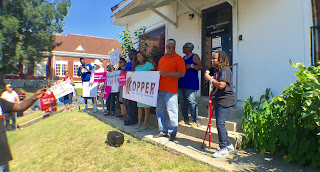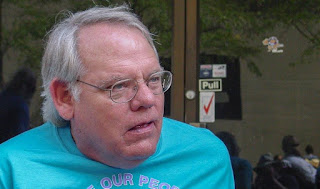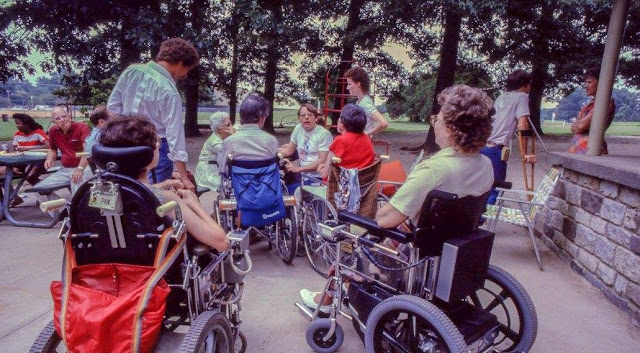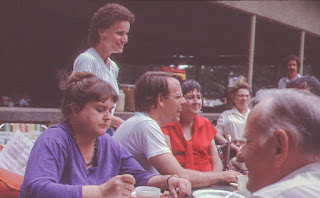Ac·cess (ak’ses), n. The right to enter or make use of.
by Louis Patrick
From the Declaration! Vol. 3 No. 3 March 1989
If you have to wage a war, you don't want to fight it block by block, building to building, house to house, room to room up and down every corridor, elevator shaft and stairwell, inch by bloody inch. That's street fighting at its worst. And that, quite literally, is the way we're having to wage the war against the architectural barriers that stand between us and our participation as full citizens of our communities, that keep us out of our churches, out of voting booths, county commission meetings and the workplace, that imprison us in our own homes.
We should be winning, at least on the front lines, in the suburbs. Every time a new building goes up - if the local officials responsible for enforcing Tennessee's Public Buildings Accessibility Act are doing their job, as they are in Memphis - disabled citizens take another building, another block. But we also have to wage a rear guard, guerilla war. If what we hear from our compatriots across the state is true, the Act is not being enforced in many communities. It's also questionable whether state officials have established the network necessary to get information to architects and contractors working here about Tennessee's accessibility law. And in too many rural towns and older neighborhoods there simply isn't enough new growth or renovation to begin to shift the balance toward a barrier free environment.
Not surprisingly, we often get so involved in the fight to take one more restaurant, one more office building, that we forget our ultimate goal. We want an open, accessible society where every trace of barriers has been eradicated, but we need to stand back and take a long, hard look at how we plan to achieve that aim.
The American National Standards Institute (ANSI) developed its first standards for accessibility in 1961, but the most important sentence in that document may be :"This standard does not establish which occupancy or building types are covered and the extent to which each type is covered."ANSI tells builders how to make a structure accessible, not that they have to. It's all tape measure, inches and feet; no teeth. We're looking for "have to," not just "how to".
We want a law-with alligator teeth and bear claws - that requires buildings to be accessible. We also want that law to have the broadest possible scope, to apply to every place in and around every kind of structure.
When the Tennessee legislature passed the Public Buildings Accessibility Act in 1970, it relied on ANSI to tell builders"how to"make buildings accessible. The Act required "public buildings" to be accessible but didn't spell out what a "public building" was, though state owned or operated buildings "used generally by the Public" were clearly included. The Act was amended in 1974 to cover not just publicly owned or leased buildings but "any building in the free enterprise system," including factories and office buildings. However. It still failed to detail "the extent to which each type is covered," to specify, for instance, the percentage of parking spaces or motel rooms that should be accessible.
In 1977 Tennessee amended the Act to adopt the Handicapped Section of the North Carolina State Building Code. In doing so we adopted not only North Carolina's mandatory specifications but its broad, clearly defined scope as well. It applies to virtually every new or renovated structure except single family homes and duplexes. It requires that assembly areas integrate seating accessible to wheelchair users and persons with other mobility impairments, 1% each, with regular seating, that 2% of parking spaces be reserved for handicapped parking and that those spaces be marked with signs at eye level it requires that 5% of apartment units be accessible or adaptable for use by wheelchair users.
When we adopted North Carolina's Code we got a great big snout full of alligator teeth. Unfortunately, we forgot some of the bear claws. We also overlooked some of the honey our neighbors had smeared on their Code - and we apparently forgot to ask permission to use their work.
North Carolina built its Code from the ground (ANSI) up in consultation with representatives of both persons with disabilities and the building industry. Carolina also enacted a tax credit "to offset the additional cost of construction of [accessible housing] units,” a "Bill of Rights for Handicapped People" which guarantees "the right of access to and use of publicly - and privately - owned spaces" and established a Special Office for the Handicapped "directed by an architect to provide interpretations, technical advice and information on compliance with code and legislative requirements for” accessibility.
There seems to have been a considerable stir in Tennessee over accessibility since the successful suit over the lack of integrated, accessible seating in the Liberty Bowl renovation. A lot of folks working here have been calling North Carolina to find out just what their law says. Understandably, North Carolina doesn't want to answer for Tennessee law. To top things off, demand for copies of "An Illustrated Handbook of the Handicapped Section of the North Carolina State Building Code" suddenly skyrocketed west of the Smokies just as Carolina had let the Handbook go out of print because they were working on a fairly extensive revision of the Code.
All of which has caused a few people to question the wisdom of departing from the the de facto national standard for accessibility, ANSI. Apart from the legitimate concerns of architects and builders who have to deal with a multiplicity of standards, Tennessee has a long way to go. Adopting ANSI or any other standard, even keeping the North Carolina Code, without taking many of the same steps as Carolina wouldn't be wise.
The North Carolina Code is a good, strong law. The officials I've talked to there have been quite helpful and have indicated their willingness to work with Tennessee. It's up to us to establish a liaison with them. It's also up to us to enforce our chosen standard and to provide technical assistance and, hopefully, incentives to the building industry to comply with that standard. We need to get our act together.














